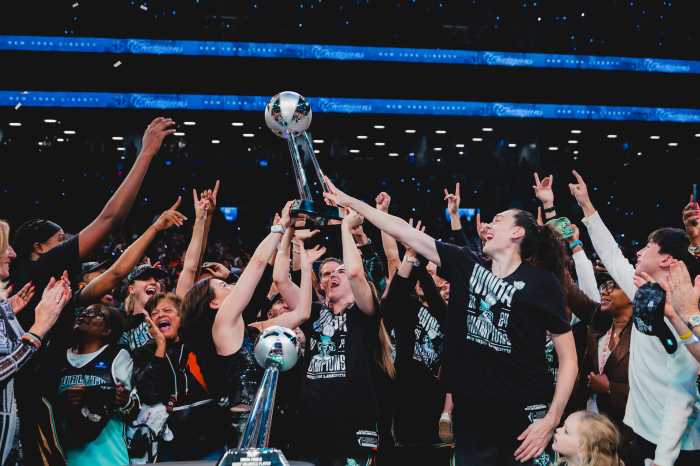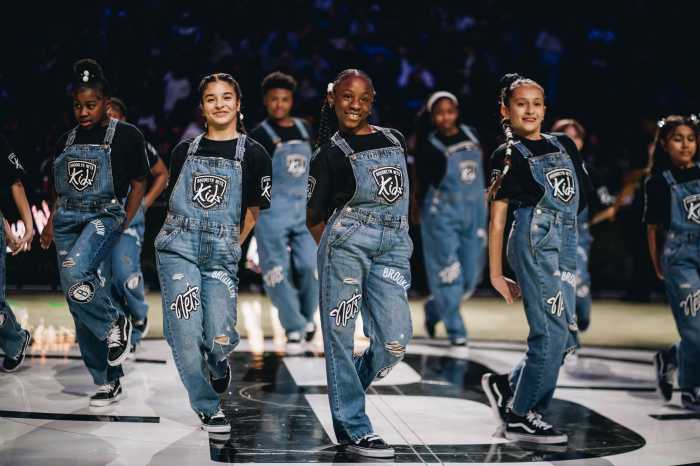The 2.5-million people living in the borough of Brooklyn, who came here from all over the world, speak dozens of different languages. But for the 30 players on the Cyclones roster, who’ve also come from all over the world, the spoken word has pretty much been narrowed down to two languages.
The Brooks, you see, field players from all over the United States and from the Dominican Republic, Mexico, and Venezuela. So it’s not surprising that the words you’ll hear around the dugout are in English and Spanish.
And sometimes, it’s a mixture of both.
The entire Cyclones’ coaching staff — manager Edgar Alfonzo, hitting coach Guadalupe Jabalera, and pitching coach Hector Berrios — is bi-lingual. But that’s not the case for the players.
And nowhere is comunication more important than between pitchers and catchers. Sure, hand signs flashed as the catcher squats behind the plate are easy enough to recognize. But what do you do when you actully have to talk to each other?
The Cyclones have a number of pitchers who speak mainly Spanish. That’s why their primary catcher, Jordan Abruz–zo, is getting in on the act.
“There are a lot of good Spanish speaking pitchers, and as a catcher, the key is communication — you have to be able to communicate with your pitcher,” he said. “I try to learn as much as I can, especially some key words to calm them down out there.”
Abruzzo pointed out that when he heads out to the mound to talk to a pitcher, he now knows that bajo means “down” and that suave means “relax.” Conversly, agresivo means to be aggressive.
Cesar Cordido, another Cyclones’ catcher, is in the opposite situation — Cordido’s first language is Spanish. So he’s doing everything he can to learn English.
“In the Venezuelan [Winter] League, I learned a little English from a couple of American imports,” he said.
But Cordido didn’t stop there.
During each spring training he takes English courses that are given by the Mets. He even won a prize this spring as the best student in his class.
A key to the Cyclones’ Spanish-English communication between players is pitching coach Hector Berrios, who’s been bi-lingual since he was a child.
“For people like me, it [speaking Spanish and English] comes naturally,” said Berrios. “I was born in Puerto Rico, and I was there for the first five years of my life [before moving to the Bronx], so that’s my natural tongue. In professional baseball I had to be the interpreter because there weren’t many coaches who only spoke Spanish.”
He’s using that ability on the Cyclones. He says it’s not so difficult, because the players all have a mutual love.
“They all mesh well because the one thing they have in common is baseball,” he said. “Baseball is great when it helps people to open up their minds to new things and how wonderful this world is when people come together. It’s a beautiful thing.”
Is there anything else that players from so many different places have in common?
Well, how about food?
Cordido has the reputation as a great cook, and he often cooked for the others in his suite. While playing chef, Cordido also teaches Spanish.
“I taught them that chicken is pollo and rice is arroz,” he said. But his lessons didn’t stop with food.
“I taught them vamos means go, and tu tienes fmeans ‘You got it.’ and yo tengo means ‘I got it.’ ”
Yeah, we got it. But does anyone have a better grasp of this than Abruzzo?
“It’s good for the Spanish speaking players to learn English and for the English speaking players to learn Spanish,” Abruzzo said. “That’s how barriers gets broken.”
And they call the catcher’s equipment “The tools of ignorance” …
Channelling the Bard
“They’re done,” the Cyclones’ fan intoned last week.
She sat, so safe, behind the home plate net.
Pronouncing death to hopes the Brooks still seek,
Those kids without a screen. It’s not a bet
The intellect would make — the post-season.
But players play — and hope — by heart, not reason.
Each week, the Bard of Brooklyn Baseball summons the spirit of his Elizabethan ancestor. This week’s edition is entitled, “By Heart, Not Reason”
























